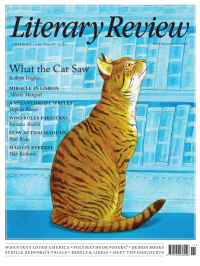Tom Holland
The Joy of Sewers
Metropolis: A History of Humankind’s Greatest Invention
By Ben Wilson
Jonathan Cape 448pp £25
Towards the end of Metropolis, Ben Wilson’s panoramic new history of urbanism, the author lists a number of ways in which cities have served to speed up evolution. In Puerto Rico, lizards can now grip bricks and concrete with their toes. Urban birds tend to have shorter wings, which enables them to dodge traffic, and they sing at a higher pitch so that they can be heard above its roar. Most startling of all is the emergence of the London Underground mosquito, ‘an entirely new species that has evolved recently in subterranean areas rich in human blood’ (admittedly, there are limits to its adaptability: a failure to master the art of changing at Piccadilly Circus means that the mosquitoes on the Bakerloo Line are now genetically different from those on the Piccadilly Line).
Wilson, however, is a historian, not an evolutionary biologist, and so his focus throughout is on one particular species. What led humans to start congregating in cities? How have they shaped and been shaped by the experience of urbanism? What are the adaptations made by Homo sapiens that might be

Sign Up to our newsletter
Receive free articles, highlights from the archive, news, details of prizes, and much more.@Lit_Review
Follow Literary Review on Twitter
Twitter Feed
Richard Flanagan's Question 7 is this year's winner of the @BGPrize.
In her review from our June issue, @rosalyster delves into Tasmania, nuclear physics, romance and Chekhov.
Rosa Lyster - Kiss of Death
Rosa Lyster: Kiss of Death - Question 7 by Richard Flanagan
literaryreview.co.uk
‘At times, Orbital feels almost like a long poem.’
@sam3reynolds on Samantha Harvey’s Orbital, the winner of this year’s @TheBookerPrizes
Sam Reynolds - Islands in the Sky
Sam Reynolds: Islands in the Sky - Orbital by Samantha Harvey
literaryreview.co.uk
Nick Harkaway, John le Carré's son, has gone back to the 1960s with a new novel featuring his father's anti-hero, George Smiley.
But is this the missing link in le Carré’s oeuvre, asks @ddguttenplan, or is there something awry?
D D Guttenplan - Smiley Redux
D D Guttenplan: Smiley Redux - Karla’s Choice by Nick Harkaway
literaryreview.co.uk